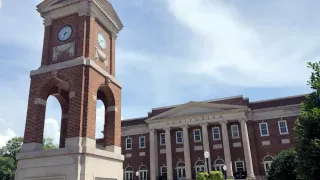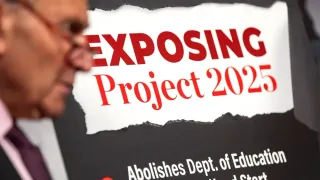May 16, 2017
US: Syria is Burning Bodies to Hide Proof of Mass Killings
Matthew Lee and Vivian Salama READ TIME: 3 MIN.
WASHINGTON -- In a move aimed at ratcheting up pressure on Russia to push the Syrian government into peace talks with rebels, the United States has accused Syria of executing thousands of imprisoned political opponents and burning their bodies in a crematorium to hide the evidence.
But the decision to release newly declassified information supporting the allegation may also test the Trump administration's own willingness to respond to atrocities in Syria, , other than chemical weapons attacks, which it blames on President Bashar Assad's government.
The accusation of mass killings and efforts to cover them up came as President Donald Trump weighs options in Syria, where the U.S. launched cruise missiles on a government air base last month after accusing Assad's military of killing scores of civilians with a sarin-like nerve agent. Trump on Monday kicked off a week of meetings with Middle East leaders, sitting down with the crown prince of Abu Dhabi a day before he hosts Turkey's president. Trump flies to Saudi Arabia later this week.
All are governments that have pressed the United States over six years of civil war in Syria to intervene more forcefully. Trump had backed away from President Barack Obama's calls for regime change in the Arab country, with the new president's officials pointedly saying leadership questions should be left to Syria's citizens, until his intervention last month. His administration now says Assad cannot bring long-term stability to Syria.
In its latest accusations of Syrian abuses, the State Department said it believed about 50 detainees each day are being hanged at Saydnaya military prison, about 45 minutes north of Damascus. Many of the bodies are then burned in the crematorium "to cover up the extent of mass murders taking place," said Stuart Jones, the top U.S. diplomat for the Middle East, accusing Assad's government of sinking "to a new level of depravity" with the active support of Russia and Iran.
The department released commercial satellite photographs showing what it described as a building in the prison complex that was modified to support the crematorium. The photographs, taken over the course of several years, beginning in 2013, do not prove the building is a crematorium, but show a facility consistent with such use, Jones said.
The revelations echoed a February report by Amnesty International that said Syria's military police hanged as many as 13,000 people in four years before carting out bodies by the truckload for burial in mass graves.
Although the State Department cast its unusual news conference as an effort to press Assad's key backers, Russia and Iran, it also underscored Trump's lack of a strategy for stopping Syria's violence. The war has killed as many as 400,000 people since 2011, contributed to Europe's worst refugee crisis since World War II and enabled the Islamic State group to emerge as a global terrorism threat.
Trump had been highly critical of Obama for failing to respond to earlier chemical weapons attacks in 2013 after setting a "red line" against such usage. After last month's attack in northern Syria, Trump said the Syrians crossed "a lot of lines" for his administration. Beyond authorizing cruise missiles in response, however, he didn't outline a strategy to eliminate the threat.
White House spokesman Sean Spicer on Monday reiterated the administration's line that Syria's future "should be decided by Syrians in a free credibly and transparent process." But he called such a future "unimaginable" if Assad is propped up with help from the "seemingly unconditional support from Russia and Iran." He didn't outline how such a future might become imaginable.
Russia has shown no inclination to drop its support for Assad. It is now pushing the idea of "de-escalation zones" that would be designed to reduce violence, while not challenging Assad's authority over almost all of Syria's major cities.
State Department spokeswoman Heather Nauert said that Secretary of State Rex Tillerson had been "firm and clear" in a meeting with Russian Foreign Minister Sergey Lavrov last week that "Russia holds tremendous influence over Bashar al-Assad."
A main point of that meeting "was telling Russia to use its power to rein in the regime," she said. "Simply put, the killing, the devastation has gone on for far too long in Syria."
Syrian human rights groups and opposition activists have long reported on mass killings inside Syrian prisons, though not on bodies being burned to cover up evidence.
The Syrian Observatory for Human Rights corroborated the U.S. accounts of mass killings but said it lacked sufficient information about the crematorium.






